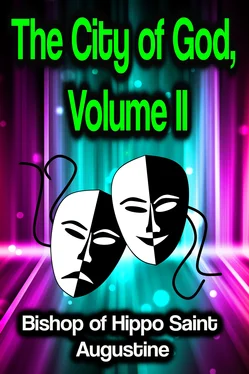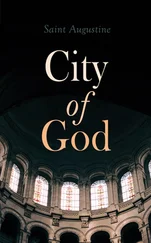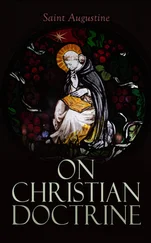1 ...6 7 8 10 11 12 ...31 18. Of the shame which attends all sexual intercourse.
Lust requires for its consummation darkness and secrecy; and this not only when unlawful intercourse is desired, but even such fornication as the earthly city has legalized. Where there is no fear of punishment, these permitted pleasures still shrink from the public eye. Even where provision is made for this lust, secrecy also is provided; and while lust found it easy to remove the prohibitions of law, shamelessness found it impossible to lay aside the veil of retirement. For even shameless men call this shameful; and though they love the pleasure, dare not display it. What! does not even conjugal intercourse, sanctioned as it is by law for the propagation of children, legitimate and honourable though it be, does it not seek retirement from every eye? Before the bridegroom fondles his bride, does he not exclude the attendants, and even the paranymphs, and such friends as the closest ties have admitted to the bridal chamber? The greatest master of Roman eloquence says, that all right actions wish to be set in the light, i.e. desire to be known. This right action, however, has such a desire to be known, that yet it blushes to be seen. Who does not know what passes between husband and wife that children may be born? Is it not for this purpose that wives are married with such ceremony? And yet, when this well-understood act is gone about for the procreation of children, not even the children themselves, who may already have been born to them, are suffered to be witnesses. This right action seeks the light, in so far as it seeks to be known, but yet dreads being seen. And why so, if not because that which is by nature fitting and decent is so done as to be accompanied with a shame-begetting penalty of sin?
19. That it is now necessary, as it was not before man sinned, to bridle anger and lust by the restraining influence of wisdom.
Hence it is that even the philosophers who have approximated to the truth have avowed that anger and lust are vicious mental emotions, because, even when exercised towards objects which wisdom does not prohibit, they are moved in an ungoverned and inordinate manner, and consequently need the regulation of mind and reason. And they assert that this third part of the mind is posted as it were in a kind of citadel, to give rule to these other parts, so that, while it rules and they serve, man's righteousness is preserved without a breach. [110]These parts, then, which they acknowledge to be vicious even in a wise and temperate man, so that the mind, by its composing and restraining influence, must bridle and recall them from those objects towards which they are unlawfully moved, and give them access to those which the law of wisdom sanctions,—that anger, e.g., may be allowed for the enforcement of a just authority, and lust for the duty of propagating offspring,—these parts, I say, were not vicious in Paradise before sin, for they were never moved in opposition to a holy will towards any object from which it was necessary that they should be withheld by the restraining bridle of reason. For though now they are moved in this way, and are regulated by a bridling and restraining power, which those who live temperately, justly, and godly exercise, sometimes with ease, and sometimes with greater difficulty, this is not the sound health of nature, but the weakness which results from sin. And how is it that shame does not hide the acts and words dictated by anger or other emotions, as it covers the motions of lust, unless because the members of the body which we employ for accomplishing them are moved, not by the emotions themselves, but by the authority of the consenting will? For he who in his anger rails at or even strikes some one, could not do so were not his tongue and hand moved by the authority of the will, as also they are moved when there is no anger. But the organs of generation are so subjected to the rule of lust, that they have no motion but what it communicates. It is this we are ashamed of; it is this which blushingly hides from the eyes of onlookers. And rather will a man endure a crowd of witnesses when he is unjustly venting his anger on some one, than the eye of one man when he innocently copulates with his wife.
20. Of the foolish beastliness of the Cynics.
It is this which those canine or cynic [111]philosophers have overlooked, when they have, in violation of the modest instincts of men, boastfully proclaimed their unclean and shameless opinion, worthy indeed of dogs, viz., that as the matrimonial act is legitimate, no one should be ashamed to perform it openly, in the street or in any public place. Instinctive shame has overborne this wild fancy. For though it is related [112]that Diogenes once dared to put his opinion in practice, under the impression that his sect would be all the more famous if his egregious shamelessness were deeply graven in the memory of mankind, yet this example was not afterwards followed. Shame had more influence with them, to make them blush before men, than error to make them affect a resemblance to dogs. And possibly, even in the case of Diogenes, and those who did imitate him, there was but an appearance and pretence of copulation, and not the reality. Even at this day there are still Cynic philosophers to be seen; for these are Cynics who are not content with being clad in the pallium, but also carry a club; yet no one of them dares to do this that we speak of. If they did, they would be spat upon, not to say stoned, by the mob. Human nature, then, is without doubt ashamed of this lust; and justly so, for the insubordination of these members, and their defiance of the will, are the clear testimony of the punishment of man's first sin. And it was fitting that this should appear specially in those parts by which is generated that nature which has been altered for the worse by that first and great sin,—that sin from whose evil connection no one can escape, unless God's grace expiate in him individually that which was perpetrated to the destruction of all in common, when all were in one man, and which was avenged by God's justice.
21. That man's transgression did not annul the blessing of fecundity pronounced upon man before he sinned, but infected it with the disease of lust.
Far be it, then, from us to suppose that our first parents in Paradise felt that lust which caused them afterwards to blush and hide their nakedness, or that by its means they should have fulfilled the benediction of God, "Increase and multiply and replenish the earth;" [113]for it was after sin that lust began. It was after sin that our nature, having lost the power it had over the whole body, but not having lost all shame, perceived, noticed, blushed at, and covered it. But that blessing upon marriage, which encouraged them to increase and multiply and replenish the earth, though, it continued even after they had sinned, was yet given before they sinned, in order that the procreation of children might be recognised as part of the glory of marriage, and not of the punishment of sin. But now, men being ignorant of the blessedness of Paradise, suppose that children could not have been begotten there in any other way than they know them to be begotten now, i.e. by lust, at which even honourable marriage blushes; some not simply rejecting, but sceptically deriding the divine Scriptures, in which we read that our first parents, after they sinned, were ashamed of their nakedness, and covered it; while others, though they accept and honour Scripture, yet conceive that this expression, "Increase and multiply," refers not to carnal fecundity, because a similar expression is used of the soul in the words, "Thou wilt multiply me with strength in my soul;" [114]and so, too, in the words which follow in Genesis, "And replenish the earth, and subdue it," they understand by the earth the body which the soul fills with its presence, and which it rules over when it is multiplied in strength. And they hold that children could no more then than now be begotten without lust, which, after sin, was kindled, observed, blushed for, and covered; and even that children would not have been born in Paradise, but only outside of it, as in fact it turned out. For it was after they were expelled from it that they came together to beget children, and begot them.
Читать дальше












